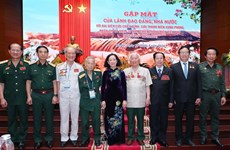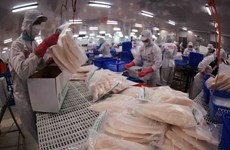Demand for goods rises ahead of Tet
The amount of money traded for goods and services in Hanoi until the
Lunar New Year (Tet) festival will increase by 20-25 percent to around
24 trillion VND (1.15 billion USD) per month, Hanoi's Industry and Trade
Department said.
The amount of money traded for goods and services in Hanoi until the
Lunar New Year (Tet) festival will increase by 20-25 percent to around
24 trillion VND (1.15 billion USD) per month, Hanoi's Industry and Trade
Department said.
Demand for essential items will increase during Christmas, New Year and the lunar New Year, according to director of the department Le Hong Thang, who spoke at a meeting on Dec. 20 with deputy chairman of the People's Committee of Hanoi Nguyen Van Suu.
Monthly demand is expected to jump to 65,000 tonnes of rice, 12,000 tonnes of pork, 6,000 tonnes of poultry meat, 90,000 tonnes of fruit and vegetable and 1,500 tonnes of confectionery, Thang said.
Supply in the capital will meet 62 percent of demand for meat with the remaining to be transported from other provinces and cities, he said.
The municipal authorities have provided loans totalling 475 billion VND for certain enterprises in the city to purchase nine essential goods to stock in order to stabilise prices, he said. Selected businesses have doubled the amount of price-stability outlets seen last year to around 670.
So far this year these businesses have begun selling essential goods during periods of high demand including the lunar New Year, he said.
Mai Khue Anh, managing director of the Hanoi Trading Corporation said their Hapro retail system will sell goods until 10pm on the last day of the lunar year and re-open the shops and supermarkets on the fourth day of the lunar New Year.
Deputy Director of Fivimart Supermarket System Vu Thi Hau, said Fivimart has signed contracts with suppliers of fresh food to ensure enough supply to maintain competitive selling prices.
The Area 1 Petrol and Oil Company has stored 40,000 tonnes of petrol and oil to meet demand during the upcoming holiday occasions in Hanoi and neighbouring provinces and cities.
Deputy Minister of Industry and trade Ho Thi Kim Thoa has insisted trading firms cooperate with suppliers and maintain levels of hygiene, food safety and stable prices.
The department will monitor the market and penalise any fraudulent trading in order to protect consumers, Thoa said, adding that businesses should increase information sharing during this periods to avoid turbulent shifts in demand and supply./.
Demand for essential items will increase during Christmas, New Year and the lunar New Year, according to director of the department Le Hong Thang, who spoke at a meeting on Dec. 20 with deputy chairman of the People's Committee of Hanoi Nguyen Van Suu.
Monthly demand is expected to jump to 65,000 tonnes of rice, 12,000 tonnes of pork, 6,000 tonnes of poultry meat, 90,000 tonnes of fruit and vegetable and 1,500 tonnes of confectionery, Thang said.
Supply in the capital will meet 62 percent of demand for meat with the remaining to be transported from other provinces and cities, he said.
The municipal authorities have provided loans totalling 475 billion VND for certain enterprises in the city to purchase nine essential goods to stock in order to stabilise prices, he said. Selected businesses have doubled the amount of price-stability outlets seen last year to around 670.
So far this year these businesses have begun selling essential goods during periods of high demand including the lunar New Year, he said.
Mai Khue Anh, managing director of the Hanoi Trading Corporation said their Hapro retail system will sell goods until 10pm on the last day of the lunar year and re-open the shops and supermarkets on the fourth day of the lunar New Year.
Deputy Director of Fivimart Supermarket System Vu Thi Hau, said Fivimart has signed contracts with suppliers of fresh food to ensure enough supply to maintain competitive selling prices.
The Area 1 Petrol and Oil Company has stored 40,000 tonnes of petrol and oil to meet demand during the upcoming holiday occasions in Hanoi and neighbouring provinces and cities.
Deputy Minister of Industry and trade Ho Thi Kim Thoa has insisted trading firms cooperate with suppliers and maintain levels of hygiene, food safety and stable prices.
The department will monitor the market and penalise any fraudulent trading in order to protect consumers, Thoa said, adding that businesses should increase information sharing during this periods to avoid turbulent shifts in demand and supply./.












